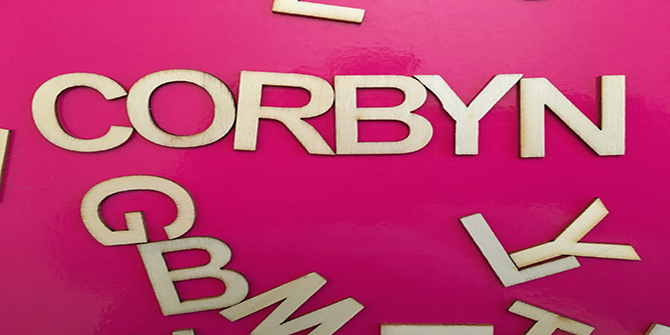 Rather unexpectedly, the DUP has become the focus of British politics. Yet it is a party few outside Northern Ireland know much about. Sophie Whiting reveals some of the characteristics of its members, and outlines how the party may negotiate a pact with the Conservatives. Ultimately, she argues, it’s not just the DUP but the dynamics of politics in Northern Ireland that have now taken centre stage.
Rather unexpectedly, the DUP has become the focus of British politics. Yet it is a party few outside Northern Ireland know much about. Sophie Whiting reveals some of the characteristics of its members, and outlines how the party may negotiate a pact with the Conservatives. Ultimately, she argues, it’s not just the DUP but the dynamics of politics in Northern Ireland that have now taken centre stage.
Northern Ireland, so often viewed as a place apart from the rest of the United Kingdom, now has its political parties at centre stage. Firstly, Sinn Féin do not take their seats at Westminster and therefore alter the arithmetic for the government to win a majority (from 326 to 322). Secondly, with an increase in their Westminster seats (from 8 to 10), the Democratic Unionist Party (DUP) are set to support Theresa May in a minority Conservative government. It is quite remarkable that a party with only 1.5% of Westminster’s MPs has such an influential role to play in the outcome of this surprise election.
The DUP are a devoutly unionist and right-wing party, and crucially the only ‘natural’ ally from which the Conservatives could seek support. This has left the DUP with a very strong hand in bartering a price for such support, whatever form this will take. For a party that is not well-known outside of Northern Ireland, this has raised many questions about who the DUP are and what would they want from some kind of arrangement in support of the Conservatives?
Our research on the DUP in 2014 outlined some views of the party’s members: two-thirds think that homosexuality is wrong; 73% oppose the legalisation of abortion in Northern Ireland (which has different abortion legislation to rest of UK); while only 4% of party members describe themselves as being non-religious. Finally, the top political priority for DUP members is to secure Northern Ireland’s place in the UK. In an age of Brexit negotiations and threats of border polls, this priority takes on a heightened sense of importance.
Unlike the 2015 election, there was little countenance this time round of a hung parliament. As a result, there was next to no media discussion of any possible post-election deals. But what is known about the DUP is their ability for long-term strategy and efficiency. It is therefore unlikely that a scenario like this would not have been considered. However, it is vital to consider the current political context in Northern Ireland to fully comprehend what the DUP would want to gain from a deal with Theresa May.
Despite Northern Ireland voting Remain, the DUP were the only major party to campaign for Brexit, arguing that leaving the EU would strengthen the United Kingdom. Yet ironically, the unique position of Northern Ireland having a land border with the Republic of Ireland, and therefore the EU, has meant that for some nationalists the partition of the island of Ireland no longer made political or economic (and to some extent practical) sense. Particularly amongst Sinn Féin, the Brexit result signalled a need for a border poll on Irish unity. From either perspective, the nature of the border has become central to political stability and economic growth. It will therefore be essential that Brexit does not restrict trade and limit the movement of people between Northern Ireland and the Republic.
Making up only 3% of the UK’s population, Northern Ireland certainly needed to shout louder in order to make its voice heard in deciding the nature of Brexit. Having a sway in the new government means that the DUP have now been given a vital opportunity to shape Brexit and also take the credit as working in the best interests for Northern Ireland. Membership of the EU also brought financial benefits to Northern Ireland in order to support projects and infrastructure associated with the peace process. There is no doubt that more money for Northern Ireland would be at the top of the DUP’s wish list in exchange for their support in the House of Commons.
Finally, the collapse of Stormont and the absence of devolution in Northern Ireland alters the relevance of the DUP’s role in supporting Theresa May. As the party of government, the Conservative Secretary of State for Northern Ireland would be the neutral facilitator of talks to get devolution back up and running. However, the DUP’s support for the Conservatives at Westminster would alter the dynamics of these discussions between Northern Ireland’s parties and sets to heighten the tension in an already fraught and distrustful process.
Whether, and how, the DUP are able to have a significant influence on the government is yet to be seen. Yet, what is clear is that the DUP have managed to present themselves as the party to protect Northern Ireland’s place in the union. As more on the politics and demands of the DUP is gradually being revealed, this election has ensured a focus on the dynamics of politics in Northern Ireland, not on this occasion a place apart.
____
 Sophie Whiting is Lecturer in Politics in the Department of Politics, Languages and International Studies at the University of Bath.
Sophie Whiting is Lecturer in Politics in the Department of Politics, Languages and International Studies at the University of Bath.
Featured image credit: Pixabay, Public Domain.








Right, get used to it. The DUP hold the balance of power and will extract a heavy price for supporting a minority Tory Brexit government.
Never heard of them until this morning? If so, that’s why some of us Irish get mildly exasperated by the British media!
This from my friend Mick Conway who is from Northern Ireland and closely follows its politics:
Founded in 1971 by Ian Paisley, the DUP has pretty consistently been a far-right, sectarian, anti-human rights party. In fairness, they did eventually sign up to the Good Friday Agreement and actually implemented it in government in Northern Ireland under Paisley’s leadership.
Different story I fear nowadays with the immense clout they will have with Brexiter Tories. They said in their manifesto that they favoured a soft Brexit. Yeah, because NI voted 56% to 44% for Remain – watch this space now.
My biggest worry is that they will try to dismantle the Good Friday Agreement under the guise of negotiating Brexit.
If they do, and the Tories accede, that could light a fuse taking us back to conflict in Ireland. Which we know only too well, spills over to the UK mainland – a ‘second front’ re-opening in Ireland is the last thing police and security services need as they struggle to contain ISIS-influenced terrorism.
It might not happen, but tiny actions can have enormous unintended consequences. My belief is that there is little or no understanding within the Tory party, the media, and indeed much of the UK population, of the delicacy and fragility of the peace process in Ireland.
And this Arlene Foster version of the DUP is no friend of the peace process.